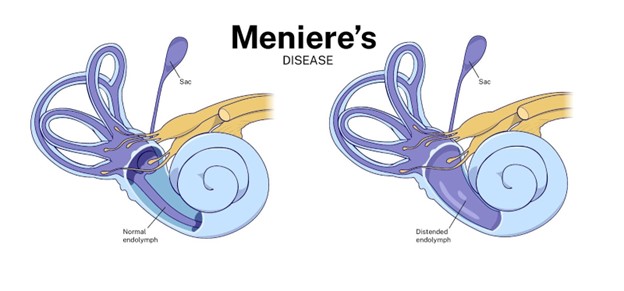A client admitted with an acute exacerbation of Ménière's disease asks the student nurse why he was prescribed diphenhydramine. Which response by the student nurse requires correction by the primary nurse?
"Ménière's disease is caused by an allergic response."
"This medication can help offset the nauseous feeling."
"Anticholinergics will help you rest."
"This medication can help reduce vomiting episodes."
The Correct Answer is A
Choice A Reason: This is incorrect because Ménière's disease is not caused by an allergic response. Ménière's disease is a disorder of the inner ear that causes vertigo, tinnitus, hearing loss, and a feeling of fullness in the ear. The exact cause of Ménière's disease is unknown, but it may be related to fluid imbalance, infection, trauma, or autoimmune reaction.
Choice B Reason: This is correct because diphenhydramine can help offset the nauseous feeling. Diphenhydramine is an antihistamine that blocks histamine receptors in the brain and inner ear, which can reduce nausea and vomiting associated with vertigo.
Choice C Reason: This is correct because anticholinergics will help you rest. Anticholinergics are a class of drugs that block acetylcholine receptors in the brain and body, which can have sedative effects and reduce motion sickness. Diphenhydramine has anticholinergic properties.
Choice D Reason: This is correct because diphenhydramine can help reduce vomiting episodes. As mentioned above, diphenhydramine can reduce nausea and vomiting by blocking histamine receptors in the brain and inner ear.

Nursing Test Bank
Naxlex Comprehensive Predictor Exams
Related Questions
Correct Answer is D
Explanation
Choice A reason: This is incorrect because laceration is not an acute traumatic brain injury, but a type of wound that involves tearing or cutting of the skin or other tissues. Laceration can occur as a result of a motor vehicle accident, but it does not cause changes in the GCS or pupil size. The nurse should assess the client's skin for any signs of laceration, such as bleeding, swelling, or infection.
Choice B reason: This is incorrect because acute subdural hematoma is not likely to cause a dilated pupil on the left side. Acute subdural hematoma is a type of traumatic brain injury that involves bleeding between the dura mater and the arachnoid mater, which are two layers of the meninges that cover the brain. An acute subdural hematoma can cause a rapid decrease in the GCS, but it usually causes a dilated pupil on the same side as the injury, not on the opposite side.
Choice C reason: This is incorrect because intracerebral hemorrhage is not likely to cause a dilated pupil on the left side. Intracerebral hemorrhage is a type of traumatic brain injury that involves bleeding within the brain tissue itself. Intracerebral hemorrhage can cause a gradual decrease in the GCS, but it usually causes neurological deficits that correspond to the location of the bleeding, such as weakness, numbness, or aphasia, not pupillary changes.
Choice D reason: This is correct because epidural hematoma can cause a dilated pupil on the left side. Epidural hematoma is a type of traumatic brain injury that involves bleeding between the dura mater and the skull. Epidural hematoma can cause a lucid interval, which is a period of normal consciousness followed by a sudden decrease in the GCS, and a dilated pupil on the opposite side of the injury, due to compression of the third cranial nerve. The nurse should notify the provider immediately and prepare for emergency surgery.
Correct Answer is B
Explanation
Choice A reason: This is incorrect because a drop in heart rate from 74 to 68/min is not a manifestation that requires immediate reporting to the provider. A mild decrease in heart rate can be normal or due to other factors such as medication, sleep, or relaxation. It does not indicate a worsening of brain injury or increased intracranial pressure.
Choice B reason: This is the correct answer because a change in the Glasgow Coma Scale score from 14 to 10 is a manifestation that requires immediate reporting to the provider. The Glasgow Coma Scale is a tool that measures the level of consciousness based on eye-opening, verbal response, and motor responses. A score of 14 indicates mild impairment, while a score of 10 indicates moderate impairment. A decrease in score can indicate deterioration of neurological status and increased intracranial pressure, which can be life-threatening.
Choice C reason: This is incorrect because the headache is not a manifestation that requires immediate reporting to
the provider. Headache is a common symptom of mild TBI and can be managed with analgesics, rest, and hydration. It does not indicate a worsening of brain injury or increased intracranial pressure unless it is severe, persistent, or accompanied by other signs such as vomiting, confusion, or seizures.
Choice D reason: This is incorrect because diplopia is not a manifestation that requires immediate reporting to
the provider. Diplopia means double vision and can be caused by damage to cranial nerves or eye muscles due to TBI. It can be treated with eye patches, glasses, or surgery. It does not indicate a worsening of brain injury or increased intracranial pressure unless it is associated with other symptoms such as blurred vision, loss of vision, or eye pain.
Whether you are a student looking to ace your exams or a practicing nurse seeking to enhance your expertise , our nursing education contents will empower you with the confidence and competence to make a difference in the lives of patients and become a respected leader in the healthcare field.
Visit Naxlex, invest in your future and unlock endless possibilities with our unparalleled nursing education contents today
Report Wrong Answer on the Current Question
Do you disagree with the answer? If yes, what is your expected answer? Explain.
Kindly be descriptive with the issue you are facing.
